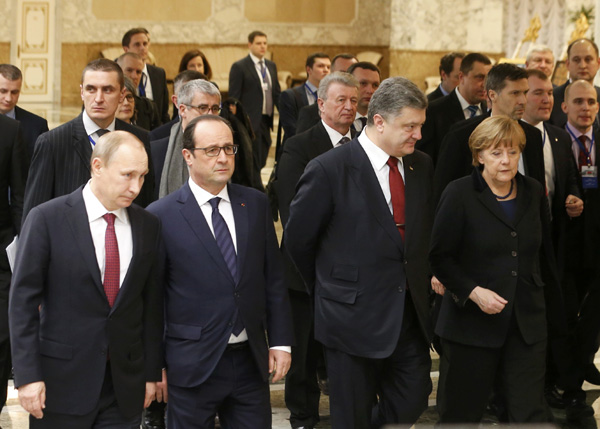Ukraine ceasefire deal offers peace chance, more efforts needed
(Xinhua) Updated: 2015-02-13 11:26
 |
|
Russia's President Vladimir Putin (L, front), Ukraine's President Petro Poroshenko (2nd R, front), Germany's Chancellor Angela Merkel (R, front) and France's President Francois Hollande (2nd L, front) walk during peace talks in Minsk, February 11, 2015. [Photo/Agencies] |
MINSK/MOSCOW - The world on Thursday breathed a sigh of relief when the leaders of Russia, Germany, France and Ukraine eventually agreed to a much-anticipated cease-fire deal on the Ukraine crisis after intensive negotiations.
The cease-fire deal, announced after more than 14 hours of discussions through the night in the Belarusian capital of Minsk, offered a flicker of peace hope for eastern Ukraine, which requires continued efforts and cooperation by all parties to ensure that the new Minsk deal will not suffer the same fate as the previous one signed in September last year.
"This is glimmer of hope, no more no less," German Chancellor Angela Merkel told reporters at a European Union summit in Brussels, Belgium. "There are still major hurdles lying ahead" and "concrete steps" must be taken, she warned.
The document, inked by all parties that signed the Minsk Protocol and the Minsk Memorandum on Sept 5 and Sept 19, 2014, is a package of measures aimed at the implementation of the Minsk agreements, which French President Francois Hollande called "a relief for Europe" and "a hope for Ukraine."
An "unconditional and comprehensive" ceasefire in eastern Ukraine starting from Feb 15 topped the package, indicating a consensus among all parties that bloodshed must be stopped immediately.
Russian President Vladimir Putin told reporters after the marathon talks that he had called on the conflicting parties to show restraint in order to avoid unnecessary casualties.
Meanwhile, Hollande thanked Putin for his influence exerted on leaders of the self-claimed Donetsk and Lugansk people's republics. He also thanked President of Ukraine Petro Poroshenko for his active participation in the negotiations.
- IMF agrees 17.5 bln in extended fund facility with Ukraine
- Ceasefire agreed for eastern Ukraine after Minsk summit
- Leaders hold Ukraine peace talks as fighting surges
- China welcomes mediation efforts in solving Ukraine crisis
- Death toll mounts in E. Ukraine ahead of peace talks
- Media give conflicting reports on ceasefire deal in Ukraine
- Contact group on Ukraine reaches ceasefire deal






